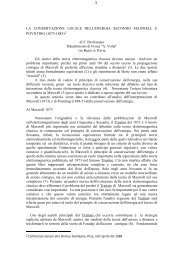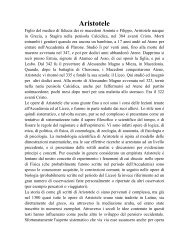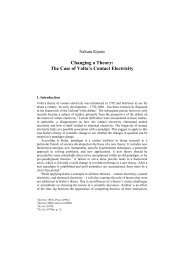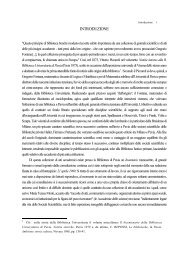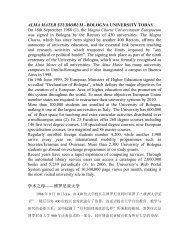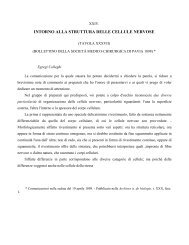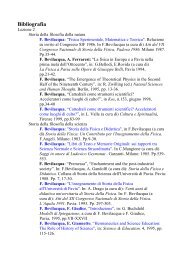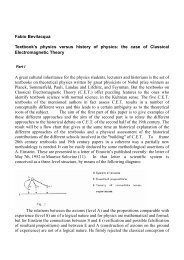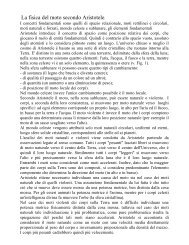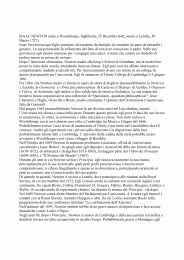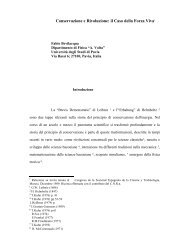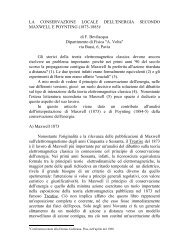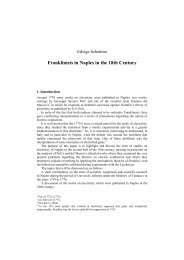Conservation and Innovation : Helmholtz's Struggle with Energy ...
Conservation and Innovation : Helmholtz's Struggle with Energy ...
Conservation and Innovation : Helmholtz's Struggle with Energy ...
Create successful ePaper yourself
Turn your PDF publications into a flip-book with our unique Google optimized e-Paper software.
Whether physiological research, apart from being the context, had been<br />
also the root or one of the roots of <strong>Helmholtz's</strong> formulation of energy<br />
conservation, has been recently discussed at length 26. <strong>Helmholtz's</strong> own point of<br />
view, expressed in 1882 <strong>and</strong> 1892 27, is that his interest in energy conservation did<br />
not arise from empirical problems in physiology but from the inclination he had<br />
acquired from a very early age in favour of the principle of the impossibility of<br />
perpetual motion 28. Autobiographical reconstructions of scientists are often<br />
unreliable, but this antiempirical remark of Helmholtz was expressed at a time<br />
when he was stressing empirical elements in science 29 <strong>and</strong> thus deserves<br />
attention. In fact in the early eighties, after the controversies <strong>with</strong> Friederich<br />
Zöllner <strong>and</strong> Karl Eugen Dühring, Helmholtz underlined, at variance <strong>with</strong> his own<br />
previous judgements, the empirical components in the early formulations of the<br />
principle of conservation.<br />
Physiology thus, according to Helmholtz, offered only the battleground<br />
for an explanation of animal heat based on the principle of impossibility of<br />
perpetual motion <strong>and</strong> on the consequent refusal of vital forces.<br />
One of the problems of mid-century German physiology was in fact the<br />
acceptance or refusal of vital forces in the explanation of the origins of animal<br />
heat 30. Liebig played a great role in this debate: already in 1841 he asserted a<br />
Fortschritte der Physik, the Erhaltung was presented to the Berlin Physikalische Gesellschaft<br />
on the 23rd of July <strong>and</strong> submitted to the Annalen der Physik.<br />
26 R.Kremer in his perceptive dissertation: "The Thermodynamics of Life <strong>and</strong><br />
Experimental Physiology, 1770-1880." Harvard University, 1984, Pp.190-3 contrasts the<br />
"st<strong>and</strong>ard" view that researches in energy conservation were motivated by physiological<br />
problems.<br />
27 Helmholtz, Hermann. "Über die Erhaltung der Kraft" in WA1 , 1882, P.74, <strong>and</strong><br />
Helmholtz, Hermann. Autobiographical Sketch , Pp.10-12.<br />
28 Koenigsberger accepted this approach: Koenigsberger, Leo. Hermann von<br />
Helmholtz. Tr. by Frances A. Welby. Oxford: Clarendon, 1906. P.8 <strong>and</strong> pp.25-6; Kremer gives<br />
a different interpretation of <strong>Helmholtz's</strong> remarks: he is more interested in denying the<br />
relevance of vitalism in physiological debates than in the role ot the principle of impossibility<br />
of perpetual motion in <strong>Helmholtz's</strong> work; see:"Therm of Life" pp.237-238.<br />
29 Helmholtz "Über die Erhaltung der Kraft" in WA1 , 1882, Pp.71-4 <strong>and</strong> "Robert<br />
Mayer's Priorität". In Vorträge und Reden. 2 Vols. Braunschweig: Vieweg, 1884.<br />
30 On the relevance of the problem see: Lenoir, Timothy. The Strategy of Life:<br />
Teleology <strong>and</strong> Mechanics in Nineteenth Century German Biology . Dordrecht <strong>and</strong> Boston:



